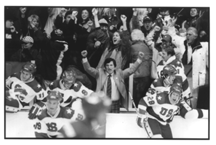As the lights dimmed and the music began, the already pumped up crowd began to squirm anxiously for the movie to start…And so it began by laying down the social and contextual frame work of the movie by showing a five minute montage timeline of the late 70’s. The movie’s plot revolves around the true story of the 1980 Lake Placid Winter Olympics, in which the heavily under matched and under experienced American team, pulled off the largest upset in Americas sports history.
The movie delves into the life of Coach Herb Brooks (Kurt Russell) and his side of the story. Amongst the training and the preparation for the games where the U.S. Hockey team wasn’t even expected to place, let alone win.
Right from the start, it is visible that the hiring committee that interviews Brooks for the job really just doesn’t want to get embarrassed like they did in the Olympics the years before.
Brooks is portrayed as the “Mad scientist” that concocts a formula for winning and will do what ever it takes to mold the players he chooses himself to win the Gold Metal.
As the movie progresses you start to see that the motivation for Brook’s drive and passion and for winning is due to his unenviable position of years earlier, when he practiced and trained for the Olympic teams and a week before the games, was cut by the coach.
That team went on to win Gold in that year’s Olympics and he makes clear that nothing will stop him from achieving his goal this time around.
The training becomes intense and at one point near brutal. But it really helps to drive the point home not only to the players, but to the audience as well.
He implements his plans in a very no nonsense kind of way and sets the ideals of working as a team and shedding the old style of individualistic play.
Brooks gets in the face of several players including Goalie Jim Craig (Eddie Cahill) who’s past seems to be impeding his playing and giving the 100 percent that coach Brooks demands.
Social strife and problems are scattered all throughout the movie, so you won’t forget what the game represents. And it even attempts to become the negative down turn at the apex of the climax right before the protagonist’s upswing, but fails because of reality and the fact that we know as fact that the games do take place.
The game footage was exceptional and it is in another league when it comes to being compared to other hockey films such as the 1992-96 Mighty Duck trilogy and the 1999 film Mystery Alaska.
Not to mention the 1977 movie Slap Shot where the comparison is easily noted as the difference between a cell phone and the telegraph.
In relation to the 1989 Miracle on Ice, the movie presents better action footage and style but it also brings a deeper more passionate feel to the story.
The story line problems despite blaring are somewhat understandable and almost dismissible. If you keep in mind the fact that it is a true to life film that has to follow the general idea, the problem is that the history sounds a lot like a Disney scripts.
Reminiscent of Mighty Ducks or many sports moves like Little Giants, The Big Green and others.
I’m sure that was to their delight even though they did over glamorize some match-ups and underplayed others such as the Final game for the gold against Finland, in which they had throughout the tournament, came back in dramatic fashion to win.
The movie does what it sets out to do. It tells the story of the 1980 U.S. Olympic Hockey team and its heroic and miraculous victory over the then seemingly superior country Russia and their greatly heralded hockey team. Despite the seemingly perfect Disney set up, the movie does not fail in sweeping you into the story. It is a feel good movie that can easily entertain audiences of all ages, even though it plays more to the 26-35 crowd more, because the event is more likely to be one of the most important things in their lives at the time when it happened.








